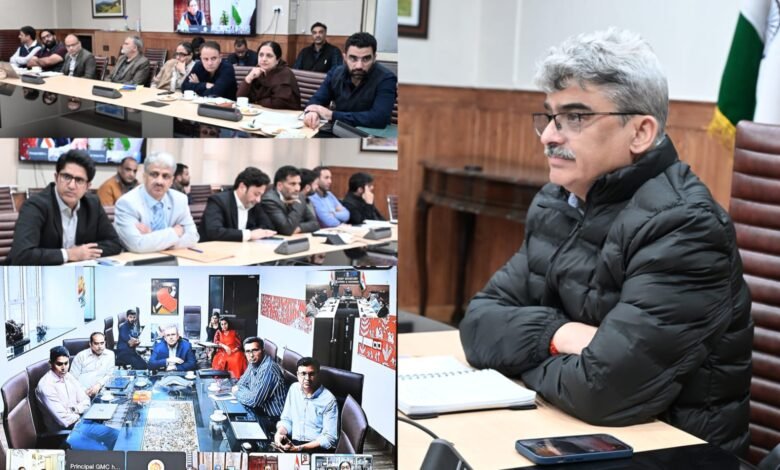CS, NITI Aayog discusses modalities for establishing Tele-ICU network across J&K

SRINAGAR, OCTOBER 22: Chief Secretary, Atal Dulloo, today held a detailed discussion with Member, NITI Aayog, Dr. V.K. Paul, to deliberate on the establishment of Tele-ICU facilities across the newly established Government Medical Colleges (GMCs) in the districts of J&K.
The meeting marked a significant step towards defining the modalities for rolling out a robust, technology-driven critical care network aimed at strengthening peripheral healthcare institutions across the UT.
During the interaction, Dr. Paul shared valuable insights and highlighted successful Tele-ICU models being implemented by leading health technology providers such as Apollo TeleHealth, Medanta, Cloudphysician, and HealthNet. He emphasized the importance of studying these models to identify best-fit strategies for J&K’s healthcare ecosystem, considering its unique geography and institutional diversity.
Dr. Paul advised that the specific needs and infrastructure of each hospital must be carefully assessed prior to implementation. He underlined the necessity of capacity building, continuous medical education, and hands-on staff training, noting that these are pivotal to ensuring the success and sustainability of the Tele-ICU framework in J&K.
Expressing gratitude for the guidance and technical inputs shared by Dr. Paul, the Chief Secretary reiterated the UT Administration’s resolve to integrate advanced healthcare innovations into its public health system. He stated that the Government of Jammu and Kashmir is working towards establishing Tele-ICU facilities under a hub-and-spoke model, ensuring 24×7 critical care monitoring, expert consultation, and real-time clinical support for peripheral hospitals. Under this model, newly established GMCs will serve as spokes connected to a central command hub within the UT.
To ensure effective implementation, the Chief Secretary proposed deputing an expert team from J&K to leading healthcare institutions across the country to study the design and operational modalities of existing Tele-ICU hubs and command centres. He emphasized that while J&K faces challenges arising from difficult terrain and human resource limitations, the administration is committed to developing a customized, scalable model that addresses regional needs and strengthens healthcare delivery at the grassroots level.
Highlighting the next steps, the Chief Secretary directed the Health & Medical Education Department to work out the technical, administrative, and financial contours of the initiative. He stressed the importance of creating a state-of-the-art Tele-ICU hub within J&K equipped with expert professionals and technology partners to provide continuous clinical guidance, training, and quality assurance. The hub would also serve as a training and mentoring centre for medical staff across the UT, eventually leading to the creation of additional regional hubs for wider Tele-ICU coverage.
Secretary, Health & Medical Education Department, Dr. Syed Abid Rashid Shah, informed that the Department has proposed the establishment of at least a 10-bedded Tele-ICU unit in each of the new GMCs. He outlined the preparatory groundwork completed so far and presented a roadmap for phased implementation, including infrastructure readiness, technology procurement, and training modules.
The participants shared insights based on the their experience in administering the critical care medicine and suggested mechanisms for seamless integration of Tele-ICU facilities with existing hospital systems. Principals of various GMCs also shared their perspectives on operational feasibility, interconnectivity, and potential clinical benefits of the initiative.
Others who were present throughout this session includes MD, NHM; MD, JKMSCL; Principals of GMCs, Dental Colleges and other concerned officers.
The deliberations underscored the J&K Administration’s focused approach towards leveraging telemedicine and digital health technologies to bridge gaps in healthcare access, particularly in remote and underserved areas. The proposed Tele-ICU network is expected to significantly enhance the Union Territory’s capacity for critical care delivery, ensuring timely medical intervention, expert supervision, and improved patient outcomes across all tiers of the healthcare system.





